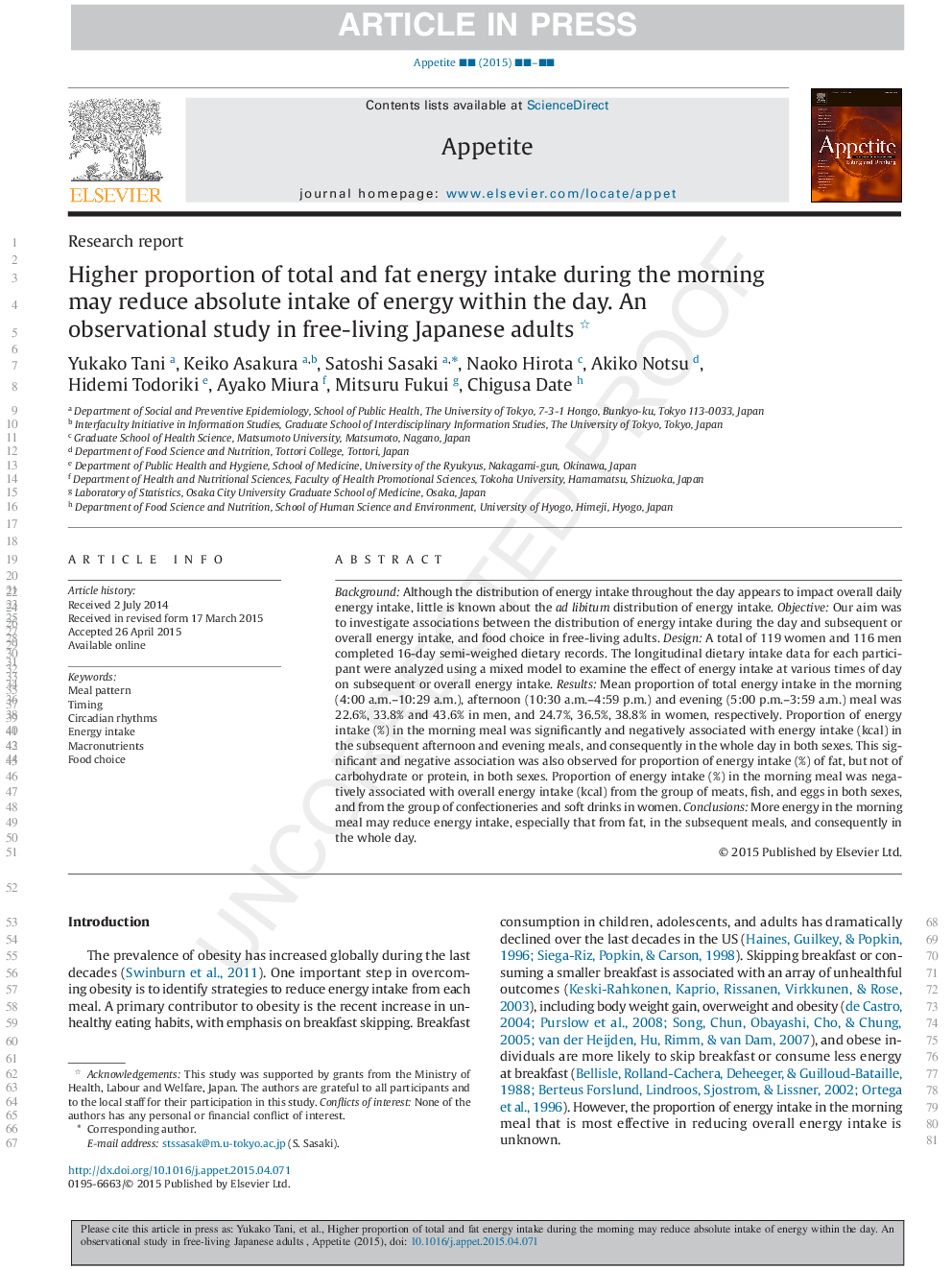| کد مقاله | کد نشریه | سال انتشار | مقاله انگلیسی | نسخه تمام متن |
|---|---|---|---|---|
| 7308378 | 1475388 | 2015 | 8 صفحه PDF | دانلود رایگان |
عنوان انگلیسی مقاله ISI
Higher proportion of total and fat energy intake during the morning may reduce absolute intake of energy within the day. An observational study in free-living Japanese adults
ترجمه فارسی عنوان
نسبت بالای مصرف انرژی کل و چربی در صبح می تواند مصرف مطلوب انرژی در روز را کاهش دهد. یک مطالعه مشاهده در بزرگسالان آزاد ژاپنی
دانلود مقاله + سفارش ترجمه
دانلود مقاله ISI انگلیسی
رایگان برای ایرانیان
کلمات کلیدی
الگوی غذا، زمان سنجی، ریتم های دورانی، مصرف انرژی، مغذی ها، انتخاب غذا،
ترجمه چکیده
سابقه و هدف: با وجودی که توزیع مصرف انرژی در طول روز به طور کلی در مصرف انرژی روزانه تاثیر می گذارد، در مورد توزیع انرژی مصرفی کم است. هدف: هدف ما بررسی ارتباط بین توزیع مصرف انرژی در طول روز و مصرف پس از یا مصرف انرژی و انتخاب غذا در بزرگسالان آزاد زندگی است. طراحی: در مجموع 119 زن و 116 مرد، 16 روز رکورد رژیم غذایی نیمه وزن را تکمیل کردند. داده های مصرف طولی رژیم غذایی برای هر یک از شرکت کنندگان با استفاده از یک مدل ترکیبی برای بررسی تأثیر مصرف انرژی در زمان های مختلف روز بر مصرف انرژی بعد یا کلی، مورد تجزیه و تحلیل قرار گرفت. یافته ها: میانگین مصرف انرژی در صبح (ساعت 4 صبح تا 10: 29 صبح)، بعد از ظهر (ساعت 10:30 صبح تا 4:60 بعد از ظهر) و شب (ساعت 5 صبح تا 3: 59 صبح) غذا 22.6٪، 33.8٪ و 43.6٪ در مردان و 24.7٪، 36.5٪ و 38.8٪ در زنان است. درصد مصرف انرژی در غذای صبح به طور معنی داری و منفی با مصرف انرژی (کیلو کالری) در بعد از ظهر و بعد از ظهر بعد از ظهر و در نتیجه در کل روز در هر دو جنس بود. این همبستگی معنی دار و منفی برای نسبت مصرف انرژی (درصد) چربی، اما نه به میزان کربوهیدرات و پروتئین در هر دو جنس مشاهده شد. درصد مصرف انرژی در غذای صبح با مصرف کلی انرژی (کیلو کالری) از گروه گوشت، ماهی و تخم مرغ در هر دو جنس و از گروه شیرینی سازی و نوشیدنی های غیر الکلی در زنان منفی بود. نتیجه گیری: انرژی بیشتری در غذا صبح می تواند سبب کاهش مصرف انرژی، به خصوص از چربی، در وعده های بعدی و در نتیجه در تمام روز باشد.
موضوعات مرتبط
علوم زیستی و بیوفناوری
علوم کشاورزی و بیولوژیک
دانش تغذیه
چکیده انگلیسی
Background: Although the distribution of energy intake throughout the day appears to impact overall daily energy intake, little is known about the ad libitum distribution of energy intake. Objective: Our aim was to investigate associations between the distribution of energy intake during the day and subsequent or overall energy intake, and food choice in free-living adults. Design: A total of 119 women and 116 men completed 16-day semi-weighed dietary records. The longitudinal dietary intake data for each participant were analyzed using a mixed model to examine the effect of energy intake at various times of day on subsequent or overall energy intake. Results: Mean proportion of total energy intake in the morning (4:00 a.m.-10:29 a.m.), afternoon (10:30 a.m.-4:59 p.m.) and evening (5:00 p.m.-3:59 a.m.) meal was 22.6%, 33.8% and 43.6% in men, and 24.7%, 36.5%, 38.8% in women, respectively. Proportion of energy intake (%) in the morning meal was significantly and negatively associated with energy intake (kcal) in the subsequent afternoon and evening meals, and consequently in the whole day in both sexes. This significant and negative association was also observed for proportion of energy intake (%) of fat, but not of carbohydrate or protein, in both sexes. Proportion of energy intake (%) in the morning meal was negatively associated with overall energy intake (kcal) from the group of meats, fish, and eggs in both sexes, and from the group of confectioneries and soft drinks in women. Conclusions: More energy in the morning meal may reduce energy intake, especially that from fat, in the subsequent meals, and consequently in the whole day.
ناشر
Database: Elsevier - ScienceDirect (ساینس دایرکت)
Journal: Appetite - Volume 92, 1 September 2015, Pages 66-73
Journal: Appetite - Volume 92, 1 September 2015, Pages 66-73
نویسندگان
Yukako Tani, Keiko Asakura, Satoshi Sasaki, Naoko Hirota, Akiko Notsu, Hidemi Todoriki, Ayako Miura, Mitsuru Fukui, Chigusa Date,
